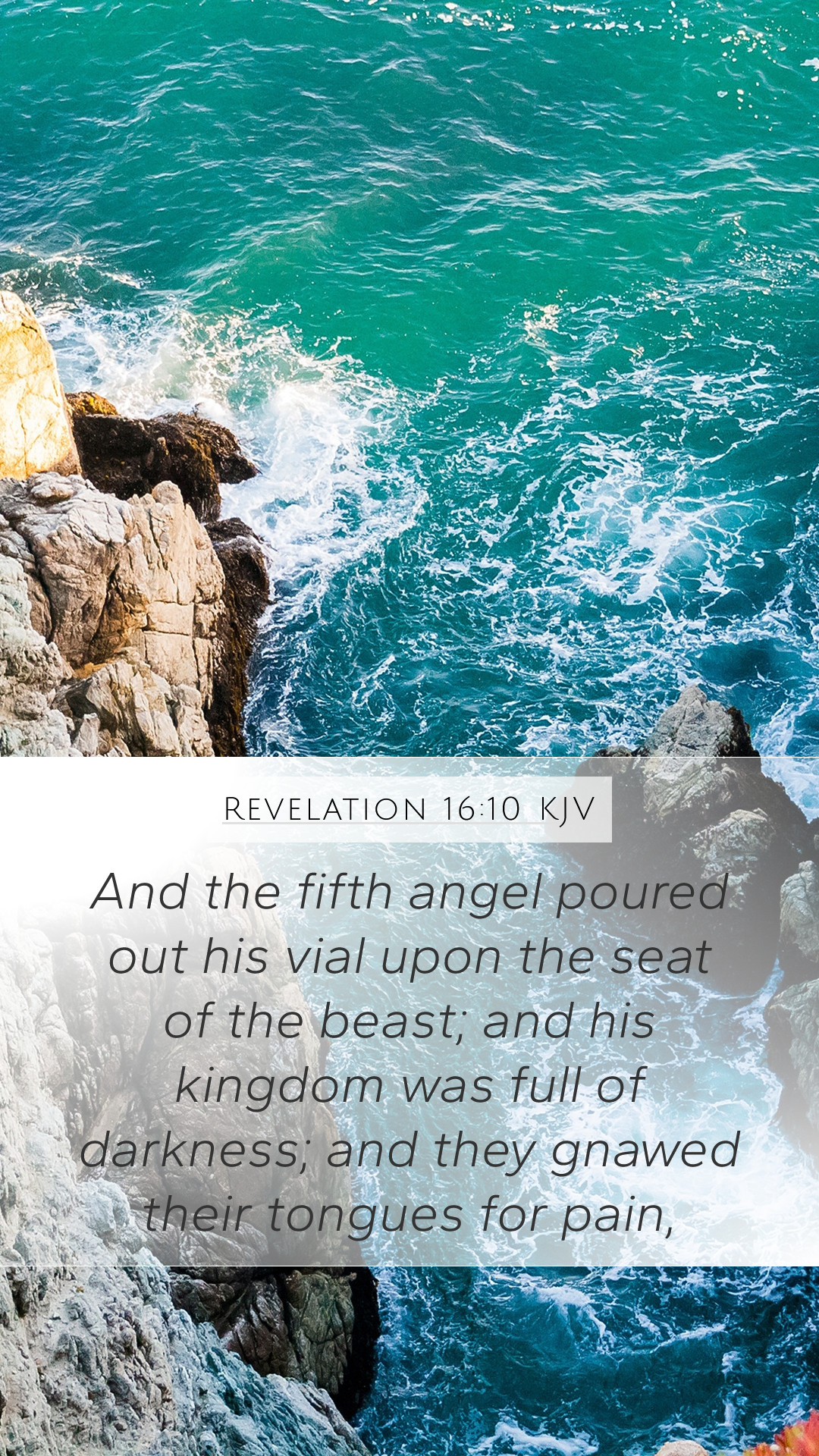Understanding Revelation 16:10
Bible Verse: Revelation 16:10
Verse Text: “And the fifth angel poured out his vial upon the seat of the beast; and his kingdom was full of darkness; and they gnawed their tongues for pain.”
Summary of Bible Verse Meaning
This verse falls within the context of the Seven Bowls of God's Wrath, which depict a series of divine judgments executed during the end times. The fifth bowl specifically targets the throne of the beast, symbolizing the reign of evil and rebellion against God. The vivid imagery of darkness and pain highlights the severe consequences faced by those who follow the beast.
Insights from Public Domain Commentaries
Matthew Henry's Commentary
Henry emphasizes that the pouring out of the vial brings about a militant phase of judgment upon the kingdom of the beast. Here, darkness symbolizes the absence of God's light and guidance. The gnawing of tongues in anguish reflects not only physical suffering but also spiritual torment—a direct result of choosing to defy God. Henry notes that this judgment reveals the futility of earthly powers in opposing divine sovereignty.
Albert Barnes' Notes on the Bible
Barnes describes the “seat of the beast” as the center of evil influence, representative of a corrupt political and religious system that opposes the reign of Christ. He interprets the darkness as a metaphor for divine abandonment; those who have aligned themselves with the beast face not only ignorance but also remorse, as indicated by their gnawing tongues for pain. Barnes points out the fact that this penalty comes upon the impenitent heart which refuses to repent even amidst suffering, emphasizing the hardness of some people’s hearts.
Adam Clarke's Commentary
Clarke notes that the fifth vial judgment displays God's power to bring down false leadership and authority. He elaborates on the darkness that permeates the kingdom of the beast, indicating a moral and spiritual deterioration that leads to desperation. The reference to gnawing tongues indicates a state of agony and regret, further symbolizing a refusal to repent and turn back towards God. Clarke urges readers to reflect on the consequences of rebellion against divine authority, providing a strong caution against complacency in faith.
Key Themes of Revelation 16:10
- Divine Judgment: The pouring of the vial symbolizes God's active role in executing judgment on those who oppose Him.
- Darkness: Serves as a metaphor for spiritual blindness and separation from God, emphasizing the darkness of a life lived in rebellion.
- Consequences of Sin: The suffering depicted illustrates the torment that results from persistent sin, highlighting the need for repentance.
- The Throne of the Beast: Represents the authority of evil, which faces God's ultimate wrath.
Application and Relevance
Understanding Revelation 16:10 offers crucial insights for those engaged in Bible study groups or online Bible study. The themes of judgment and the consequences of turning away from God remain relevant for both personal reflection and communal discussions. This verse invites believers to consider the importance of aligning themselves with God’s purposes and the dangers of succumbing to worldly influences.
Additional Bible Cross References
- Matthew 8:12: "But the children of the kingdom shall be cast out into outer darkness: there shall be weeping and gnashing of teeth."
- 2 Peter 2:4-6: Discusses the judgment of angels and the destruction of ancient sinful cities, emphasizing God’s authority in judgment.
- Revelation 14:10: "The same shall drink of the wine of the wrath of God..." further elaborates on the repercussions of aligning with the beast.
Conclusion
Revelation 16:10 serves as a powerful testament to the consequences of rejecting God’s sovereignty. The combined insights from key biblical scholars encourage deeper Bible study insights and provide a framework for understanding difficult passages. Engaging with this text invites profound reflection on the choices we make and the ultimate outcome of those decisions in light of God's eternal kingdom.


